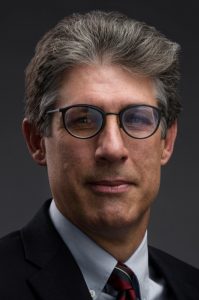Speaker: Professor Curt A. Bronkhorst, Associate Chair for Undergraduate Studies in the Engineering Physics Department
Abstract: Damage of structural components taking place within materials whose structural state evolve with deformation remains a significant area of research due to significant economic and strategic importance. Material damage events are generally spatially isolated events as they initiate followed by growth of each event, interaction of events, percolation of interaction fields leading to ultimate failure of the component. For metallic material types which are not limited in availability of dislocation glide systems, the damage process is composed of combinations of pore based and shear band based mechanisms. The way in which these two basic mechanisms combine is generally a function of material type, initial conditions of the material, and imposed boundary conditions. In this process, the partitioning of supplied deformation energy into the differing deformation, structural, and thermodynamic variables is a very important factor. This process is also strongly influence by the structural state of the material with defects forming a critical role in the early stages and introducing critical statistical aspects. In this talk, we will discuss both the theory of representing ductile damage and computational frameworks to enable representation minimizing the influence of mesh size and topology. This will be done in concert with physical motivation and quantitative challenge from experimental results. Specifically we will talk about the relative contributions of temperature increase due to plastic work and the role of recrystallization processes on the softening response of austenitic steels during adiabatic shear banding. A theory for representing the appropriate structural evolution during dynamic loading will be presented in the context of a regularized computational technique to avoid the perennial issue of mesh sensitivity. This theory is also cast within a thermodynamically consistent framework which begins to account for energy partitioning during such events. Porosity based damage will also be discussed in the context of a bcc refractory material with a prominent location of pore nucleation being grain boundaries. A soft-scale coupling procedure is employed to enable detail micromechanical examination of probable nucleation conditions at the early stage of damage. A strategy to represent the statistics of structural evolution during early stage deformation leading to porosity nucleation will be discussed in the context of experimental results. We will also discuss the many remaining questions surrounding ductile damage for metallic materials.
Bio: Professor Curt A. Bronkhorst is Associate Chair for Undergraduate Studies in the Engineering Physics Department. He also has appointments in the Mechanical Engineering Department and Materials Science & Engineering Department. He is Guest Scientist within the Theoretical Division at Los Alamos National Laboratory. He is Honorary Commander for the Wisconsin Air National Guard 115th Fighter Wing. He is fellow of the American Society of Mechanical Engineers. He is a member of the ASME Materials Division Executive Committee. He is Associate Editor of the International Journal of Plasticity. He is also president of Northland Partners, LLC.